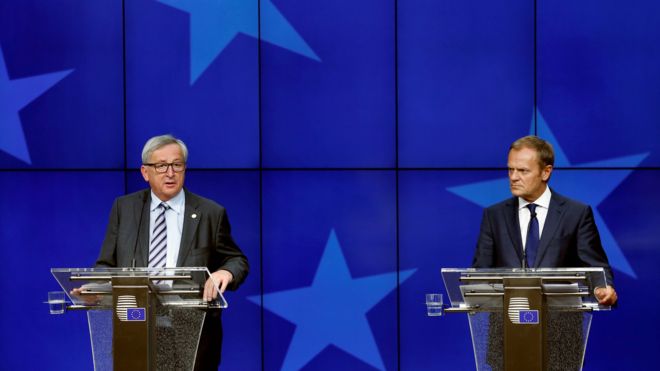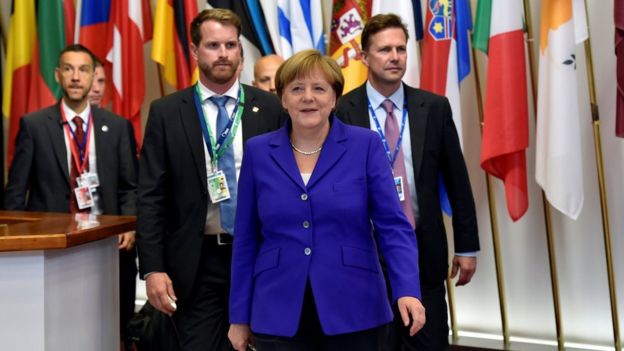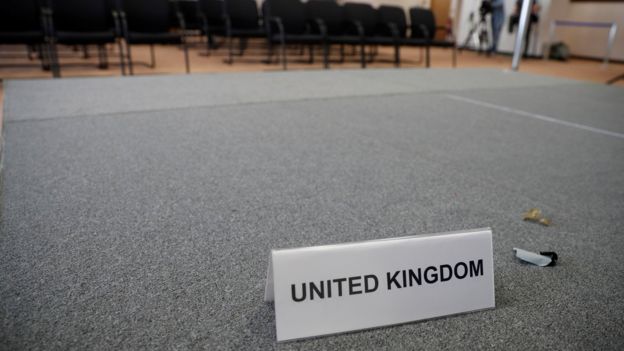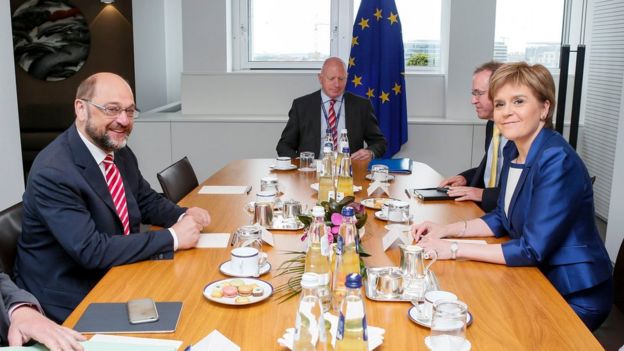- 36 minutes ago
- Europe
 REUTERS
REUTERS
European Union leaders have warned that the UK must honour the principle of free movement of people if it wants to retain access to the single market after it leaves the bloc.
European Council President Donald Tusk said the UK could not pick and choose.
The French and German leaders also made clear that the freedom of movement of EU citizens was non-negotiable.
Immigration to the UK, particularly from poorer EU countries, was a key issue in the referendum campaign.
Some campaigners for Leave sent a clear message that the vote was about controlling immigration levels.
- Follow live updates on Labour and Tory leadership
- Brexit: What happens now?
- Reality Check: Have Leave campaigners changed their tune?
- Cameron: UK will not shun Europe
- Brexit models: Norway or Canada?
Outgoing UK Prime Minister David Cameron said that the issue of freedom of movement would be for the next PM and government to decide.
"I'm in no doubt that this is the difficult issue," he told MPs in Westminster.
"Frankly, it's a difficult issue inside the EU, where you've got all the negotiating ability to try and change things, and I think it will be in many ways even more difficult from outside."
However EU leaders appear united after Wednesday's meeting that there will be no "nuances", as Mr Juncker put it, for the UK.
Mr Tusk said there would be another meeting of EU leaders, again excluding the UK, on 16 September in Bratislava to discuss the so-called "Brexit".
Mr Juncker said that there would be no discussions whatsoever with representatives of the UK on a possible post-Brexit relationship until the UK has formally notified the EU of its intention to leave by invoking Article 50 of the Lisbon Treaty.
There could be "no negotiation without notification", he said.
 REUTERS
REUTERS
The leaders of the 27 member states, excluding Britain, said in a statement that they hope to have the UK as a close partner of the EU in future "and we look forward to the UK stating its intentions in this respect.
"Any agreement, which will be concluded with the UK as a third country, will have to be based on a balance of rights and obligations. Access to the single market requires acceptance of all four freedoms."
The "four freedoms" that underlie the EU's internal market are the freedom of movement of goods, workers, services and capital.
At the scene: Laurence Peter, BBC News, Brussels
The 27 leaders, now minus the UK, made it clear that the EU has to regroup, rally its forces and rethink its strategy.
You could say the EU is acting like a general after losing a battle - but a general determined to continue the campaign.
"We hope to have the UK as a close partner of the EU and we look forward to the UK stating its intentions in this respect," they said.
But all the leaders were clear that you cannot have the advantages of the EU single market without playing by the rules - including free movement of people.
Brexit is a huge crisis for the EU. German Chancellor Angela Merkel said "we have no illusions - it's a qualitatively different task" compared with previous crises.
They are all worried about contagion from the UK's economic instability.
Italy's Prime Minister Matteo Renzi left the summit with a sting in the tail, saying: "The Brits have made a choice. We are sorry, but at the end of the day they will be worse off - not Europe."
German Chancellor Angela Merkel also reiterated that there would be no discussions with the UK until Article 50 was formally triggered by the UK government.
"We wish that that would happen as soon as possible," she said.
 REUTERS
REUTERS PA
PA
Meanwhile Scotland's First Minister, Nicola Sturgeon, is in Brussels to discuss her country's relationship with the EU, after Scottish voters opted to remain in the EU.
Mr Juncker, who is to meet Ms Sturgeon later, said Scotland had won the right to be heard, but the EU did not want to interfere in the UK's internal affairs.
The French president and Spanish prime minister have both said they are opposed to the EU negotiating potential membership for Scotland.
At Westminster political uncertainty continues as the Opposition Leader, Jeremy Corbyn, seems certain to face a leadership challenge. Mr Cameron told Mr Corbyn to stand down in the national interest.
Nominations for a new Conservative leader to replace Mr Cameron have opened.
On Thursday, the BBC has experts who will be answering questions about the decision of the United Kingdom to leave the European Union. If you have a query about what Brexit might mean for your work, business or living as a British citizen in an EU member state, share it with us in the following ways:
Email haveyoursay@bbc.co.uk with your stories.
Please include a contact number if you are willing to speak to a BBC journalist. You can also contact us in the following ways:

No comments:
Post a Comment